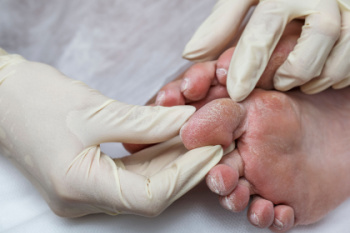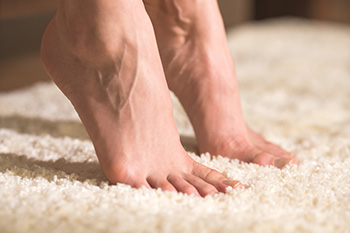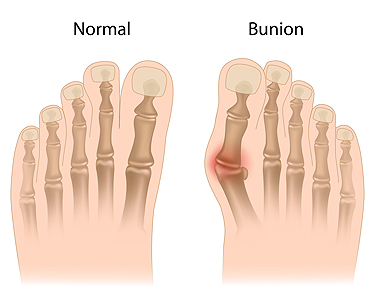March 2024
How Freiberg's Disease Affects Teens

Freiberg's disease is characterized by cartilage degeneration in the lesser metatarsal heads of the feet, notably affecting adolescent females, though it can occur in both genders later in life. The condition primarily involves the second and third metatarsals. While the exact cause remains unclear, vascular problems, genetic predisposition, and altered biomechanics are common causes. Diagnosis by a podiatrist includes clinical evaluation and imaging confirmation. In many cases X-rays show normal bone formation in early stages and flattened, fragmented metatarsal heads as the disease progresses. Treatment focuses on relieving foot pressure and may involve nonoperative measures such as activity modification and custom orthotic support. Surgical interventions are considered for advanced cases. Outcomes for Freiberg’s disease from both nonoperative and operative management are generally favorable, allowing most patients to resume previous activities. To find out what may be causing metatarsal foot pain, it is suggested that you make an appointment with a podiatrist.
Some foot conditions may require additional professional care. If you have any concerns, contact one of our podiatrists of North Bay Ankle & Foot Center. Our doctors can provide the care you need to keep you pain-free and on your feet.
Rare Foot Conditions
The majority of foot conditions are common and can be treated by a podiatrist. Standard diagnostic procedures are generally used to identify specific conditions and treatment can be rendered. A podiatrist also treats rare foot conditions which can be difficult to diagnose and may need extra attention and care.
There are many rare foot conditions that can affect children. Some of these can include:
- Freiberg’s disease
- Kohler’s disease
- Maffucci syndrome
Freiberg’s disease - This can be seen as a deterioration and flattening of a metatarsal bone that exists in the ball of the foot. It typically affects pre-teen and teenage girls, but can affect anyone at any age. Symptoms that can accompany this can be swelling, stiffness, and the patient may limp.
Kohler’s disease - This often targets the bone in the arch of the foot and affects younger boys. It can lead to an interruption of the blood supply which ultimately can lead to bone deterioration. The patient may limp or experience tenderness, swelling, and redness.
Maffucci syndrome - This affects the long bones in a child’s foot leading to the development of abnormal bone lesions. They are benign growths and typically develop in early childhood and the bones may be susceptible to breaking.
A podiatrist can properly diagnose and treat all types of rare foot conditions. If your child is affected by any of these symptoms or conditions, please don’t hesitate to call our office so the correct treatment method can begin.
If you have any questions please feel free to contact our offices located in Petaluma and Sonoma, CA . We offer the newest diagnostic tools and technology to treat your foot and ankle needs.
Care for Diabetic Feet

Caring for diabetic feet is imperative for preventing serious problems. Diabetes can lead to nerve damage, known as neuropathy, causing feet to become insensitive to pain, heat, and pressure. Consequently, minor injuries can go unnoticed, leading to infections, ulcers, or even amputation if left untreated. Plus, poor blood circulation associated with diabetes slows wound healing, increasing the risk of infections. Diabetic feet require meticulous care, including regular inspections for cuts, blisters, or sores, as well as maintaining proper hygiene. Trimming toenails straight across reduces the risk of ingrown nails and potential infections. It is essential to wear well-fitted shoes and socks to prevent rubbing and pressure points that can lead to skin breakdown. If you have diabetes, it is strongly suggested that you schedule an appointment with a podiatrist for routine foot checks for early detection of any issues.
Diabetic foot care is important in preventing foot ailments such as ulcers. If you are suffering from diabetes or have any other concerns about your feet, contact one of our podiatrists from North Bay Ankle & Foot Center. Our doctors can provide the care you need to keep you pain-free and on your feet.
Diabetic Foot Care
Diabetes affects millions of people every year. The condition can damage blood vessels in many parts of the body, especially the feet. Because of this, taking care of your feet is essential if you have diabetes, and having a podiatrist help monitor your foot health is highly recommended.
The Importance of Caring for Your Feet
- Routinely inspect your feet for bruises or sores.
- Wear socks that fit your feet comfortably.
- Wear comfortable shoes that provide adequate support.
Patients with diabetes should have their doctor monitor their blood levels, as blood sugar levels play such a huge role in diabetic care. Monitoring these levels on a regular basis is highly advised.
It is always best to inform your healthcare professional of any concerns you may have regarding your feet, especially for diabetic patients. Early treatment and routine foot examinations are keys to maintaining proper health, especially because severe complications can arise if proper treatment is not applied.
If you have any questions please feel free to contact our offices located in Petaluma and Sonoma, CA . We offer the newest diagnostic and treatment technologies for all your foot and ankle needs.
Foot and Ankle Injury Rehab Exercises

Foot and ankle injuries require rehabilitation exercises overseen by a podiatrist to restore strength, flexibility, and stability. These foot and ankle exercises include ankle pump-ups, targeting improved ankle dorsiflexion and lower leg muscle strengthening. Ankle pump-downs enhance ankle plantarflexion and strengthen calf muscles. Bent-knee wall stretches are specifically focused on the soleus muscle for recovery from disuse muscle atrophy. Straight-knee wall stretches are employed for comprehensive calf muscle stretching. Toe pick-ups are aimed at strengthening toe muscles and enhancing flexibility. Heel raises are performed to fortify toes, feet, and calves. It's imperative to execute these exercises under the guidance of a podiatrist to ensure correct technique and to prevent further injury. If you encounter severe discomfort or pain while performing rehab exercises, it is suggested that you make an appointment with a podiatrist as soon as possible.
Exercising your feet regularly with the proper foot wear is a great way to prevent injuries and build strength. If you have any concerns about your feet, contact one of our podiatrists from North Bay Ankle & Foot Center. Our doctors can provide the care you need to keep you pain-free and on your feet.
Exercise for Your Feet
Exercise for your feet can help you gain strength, mobility and flexibility in your feet. They say that strengthening your feet can be just as rewarding as strengthening another part of the body. Your feet are very important, and we often forget about them in our daily tasks. But it is because of our feet that are we able to get going and do what we need to. For those of us fortunate enough to not have any foot problems, it is an important gesture to take care of them to ensure good health in the long run.
Some foot health exercises can include ankle pumps, tip-toeing, toe rises, lifting off the floor doing reps and sets, and flexing the toes. It is best to speak with Our doctors to determine an appropriate regimen for your needs. Everyone’s needs and bodies are different, and the activities required to maintain strength in the feet vary from individual to individual.
Once you get into a routine of doing regular exercise, you may notice a difference in your feet and how strong they may become.
If you have any questions please feel free to contact our offices located in Petaluma and Sonoma, CA . We offer the newest diagnostic and treatment technologies for all your foot and ankle needs.
Understanding What Bunions Are

A bunion, medically known as hallux valgus, is a common foot deformity that affects the joint at the base of the big toe. It appears as a bony bump on the side of the foot, causing the big toe to bend inward toward the lesser toes. Bunions develop gradually over time due to various factors, including genetics, foot structure, and footwear choices. Wearing tight, narrow shoes and high heels can accelerate the condition by putting pressure on the toes and forcing them out of alignment. As the bunion progresses, individuals may experience pain, swelling, redness, and restricted movement in the affected toe. Bunions can interfere with daily activities and affect overall foot function. It is suggested that you seek professional advice from a podiatrist for an exam. This medically trained foot doctor can offer treatment options that can help to alleviate symptoms and prevent complications.
If you are suffering from bunions, contact one of our podiatrists of North Bay Ankle & Foot Center. Our doctors can provide the care you need to keep you pain-free and on your feet.
What Is a Bunion?
A bunion is formed of swollen tissue or an enlargement of boney growth, usually located at the base joint of the toe that connects to the foot. The swelling occurs due to the bones in the big toe shifting inward, which impacts the other toes of the foot. This causes the area around the base of the big toe to become inflamed and painful.
Why Do Bunions Form?
Genetics – Susceptibility to bunions are often hereditary
Stress on the feet – Poorly fitted and uncomfortable footwear that places stress on feet, such as heels, can worsen existing bunions
How Are Bunions Diagnosed?
Doctors often perform two tests – blood tests and x-rays – when trying to diagnose bunions, especially in the early stages of development. Blood tests help determine if the foot pain is being caused by something else, such as arthritis, while x-rays provide a clear picture of your bone structure to your doctor.
How Are Bunions Treated?
- Refrain from wearing heels or similar shoes that cause discomfort
- Select wider shoes that can provide more comfort and reduce pain
- Anti-inflammatory and pain management drugs
- Orthotics or foot inserts
- Surgery
If you have any questions, please feel free to contact our offices located in Petaluma and Sonoma, CA . We offer the newest diagnostic and treatment technologies for all your foot care needs.






